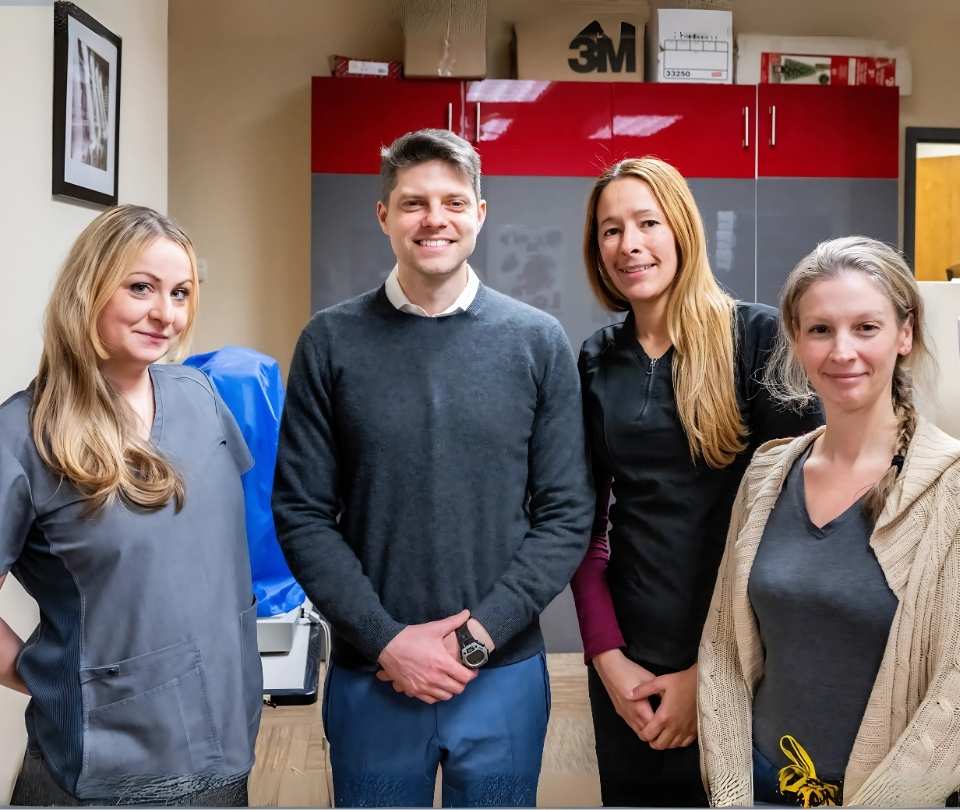Central Serous Chorioretinopathy (CSCR)


Request an Appointment
Central Serous Chorioretinopathy (CSCR) is a retinal condition where a small pocket of fluid accumulates under the macula, the central part of the retina responsible for sharp, detailed vision. This often results in visual distortions that may include blurred or wavy vision. It is an important topic because early detection and management can help preserve visual function and prevent long-term damage. Associated Eye Physicians & Surgeons of NJ proudly offers eye care at four convenient locations: Belleville serving Essex County, Rahway serving Middlesex and Union Counties, Jersey City serving Hudson County, and Union serving Union County.
Dr. Bradford Carter Liva is a board-certified ophthalmologist specializing in retinal care, with a focus on injectable treatments for macular degeneration and diabetic retinopathy.
What is Central Serous Chorioretinopathy (CSCR)?
CSCR occurs when a defect in the normally water-tight layers beneath the retina allows fluid to seep under the macula. This fluid forms a blister-like elevation that alters the normal structure of the retina, leading to changes in your central vision. Although the exact cause is not completely understood, CSCR is recognized by its characteristic leakage of fluid beneath the retinal pigment epithelium (RPE).
Your retina is like a high-precision camera sensor that processes images and sends that information to your brain. When a small pocket of fluid disrupts this carefully maintained structure, the result can be visual distortions—much like a smudge on a camera lens. This condition most commonly affects men between the ages of 30 and 50, though it can occur in others as well.




When Should You See a Retina Specialist?
If you notice any changes in your vision, it’s important to get your eyes checked right away. Here are some signs that mean you should see a retina specialists:
How is CSCR Diagnosed?
Diagnosing Central Serous Chorioretinopathy (CSCR) involves using special tests to get a clear view of the retina.
Here’s how it’s done:




Risk Factors That Can Contribute to CSCR
While the exact cause of CSCR remains unclear, certain associated factors have been identified. Recognizing these risk factors can help in understanding why some people may be more prone to developing this condition.
Prognosis and Long-Term Outlook
The overall prognosis for central serous chorioretinopathy remains positive for the vast majority of patients. In many instances, the leakage stops by itself, and the fluid is absorbed over time, with most individuals regaining near-normal vision. However, it is important to understand that even after the fluid dissipates, there might be subtle visual changes that persist. These can include mild distortions or a degree of decreased contrast sensitivity, particularly noticeable when the lighting changes.
Even though more than 80% of patients do not experience bilateral symptoms, a small number may develop CSCR in both eyes over time, especially if underlying risk factors persist. There is also a chance that in some patients, CSCR may become a recurrent condition. Recurrence rates have been reported to be between 20% and 30%, with some studies suggesting even higher rates in more challenging cases.
Regular follow-up appointments with our Retina Specialists’ are essential for monitoring long-term changes in the retina. These visits allow for timely intervention if there is any sign of new or recurring fluid buildup. Persistently elevated or recurring fluid can lead to progressive degeneration of the outer retina, making proactive communication with your eye care team a critical element in long-term management.


Treatment Approaches for CSCR
Central Serous Chorioretinopathy (CSCR) is a condition that can resolve on its own in many cases, but chronic or recurrent cases may require treatment to prevent long-term vision problems.
Here are the main treatment options based on recent studies:
Frequently Asked Questions About CSCR
Your Trusted Retina Specialists Serving Central and Northern NJ
Central Serous Chorioretinopathy is a significant condition that can affect your vision quality. Early detection and treatment are crucial, and our retina specialists are skilled in managing this complex issue. At Associated Eye Physicians & Surgeons of New Jersey, we prioritize patient care and aim to help you maintain your visual health. By understanding CSCR and its implications, you can take proactive steps to preserve your sight. Experience personalized, expert eye care by scheduling an appointment with our eye doctors in Belleville, Jersey City, Rahway, or Union, NJ.
Request an Appointment
- Retinal Diseases
- Diabetic Retinopathy
- Juxtafoveal Telangiectasis
- Macular Degeneration
- Macular Holes
- Retinal Tears & Detachments
- Vascular Occlusions
- Sudden Vision Changes
- Uveitis
- Vitreous Hemorrhage
- Retina Treatments
- CRVO
- CSCR
- Choroidal Hemangioma
- Degenerative Retinoschisis
- Macular Pucker
- Plaquenil Toxicity
- Anti-VEGF
- Lowering AMD Risk
- Fundus Photography
- FFA
- Optical Coherence Tomography
- Eye Vitamins
- Driving With AMD
- Blood Glucose & Vision
- Early AMD Signs
- Living With AMD
- Reading With AMD
- Independent With AMD
- AMD & Blurry Vision
- Eye Floaters
At Associated Eye Physicians of NJ, we’ve built our reputation on care that’s local, personal, and easy to get to. With offices in Belleville, Union, Jersey City, and Rahway, we’re proud to serve a wide range of communities across North and Central Jersey. Our Belleville team welcomes patients from all over Essex County, including Newark, Bloomfield, and Nutley. Rahway welcomes patients from across Middlesex and Union Counties, including nearby patients from Elizabeth, Avenel, Woodbridge, and Perth Amboy. Our Union office is a favorite for families from Union County, especially for those in Elizabeth and Cranford. And in Jersey City, we care for Hudson County residents, including our neighbors in Hoboken and Bayonne.

